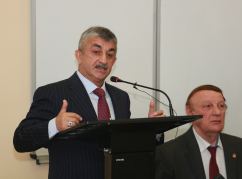The WAC Discussion club to discuss topics of relevance to the entire Abkhaz-Abaza ethnic group will begin its work in early November of this year.
Said Bargandzhia
The World Abaza Congress opens a Discussion club in Abkhazia, which will become a platform for discussing a wide range of topics related to the preservation and development of the Abkhaz-Abaza people. The club, in the meetings of which citizens of the Republic of all social and age groups can take part, will open on November 7. It will be headed by Irina Turava, senior lecturer at the Department of Political Science and Sociology of the ASU.
According to her, the main principle of the club’s work will be the peer-to-peer format, which assumes the most open, sincere and direct interaction between all club members. The teacher calls this approach “lack of boundaries”.
“We plan to arrange our meetings in such a way that young people have the opportunity to ask any questions that they are interested in for the older generation, so that ordinary citizens have the opportunity to directly contact the representatives of the expert community, and dignitaries. Speaking about the lack of borders, I mean, including the way the club operates: absolutely all meetings, whether it be a lecture, a practical lesson or training, will take place without separating the audience from the speaker - no tribune, no tables,” assured Irina Turava.
She noted that one of the main tasks in organizing the work of the club is to make participation in meetings as comfortable as possible in everything. Therefore, there will be “no membership fees and other financial investments” for club members.
“And in order to make the atmosphere as comfortable as possible and conducive to the exchange of thoughts and ideas, at the end of the meetings members will be offered tea,” the club leader promised.
Irina Turava named six main areas of the club’s work: the preservation and development of the Abkhaz language, the promotion of literature in the native language, the preservation of the historical and cultural heritage of the Abkhaz-Abaza ethnic group, the development and popularization of domestic science, the preservation of the traditional moral and ethical code of Apsuara and ecology and environment protection.
Each topic involves a variety of meeting formats. It can be a lecture, training, interactive with experts, a round table. Work on each topic will be carried out for three months, and its result will be the opportunity to submit a ready-made project for the WAC grant. The teacher added that a commission will be created that will consider all applications and select the most promising projects.
“Immediately after the opening, we [for members of the club] will hold a series of meetings with the leadership of the regional branch of the WAC in the Republic of Abkhazia and the leadership of the Information Portal, so that everyone would have the opportunity to ask interesting questions about the activities of the Congress in our country, find out about immediate plans and, if they wish so, to become active participants in the process,” said Irina Turava.
She noted that the club also planned autonomous (outside the six main topics - ed.) projects that will operate “in their own mode”, and the first such project is the “Parent club”, which is scheduled for launch in late November.
In order to become a member of the discussion club, you need to fill out a questionnaire, choose a direction of interest and send an application for participation to the club leader by e-mail (discussclub@abaza.org). The number of seats in each of the areas is limited: this is due to the fact that the room in which club meetings will be held (“Alashara” office, the building of the Academy of Sciences of the Republic of Abkhazia on Lakoba Street, 1st floor) will not accommodate more than 25-30 people. At the same time, if there are more people wishing to participate in the discussion of a topic, the organizers will look for an opportunity to repeat the cycle. The most significant meetings will be recorded and uploaded to the WAC YouTube channel. It is also planned to broadcast individual club meetings live on social networks.

to login or register.